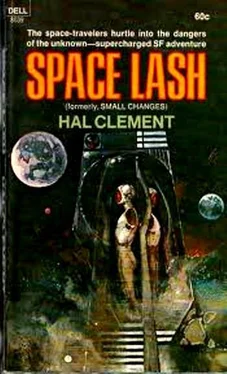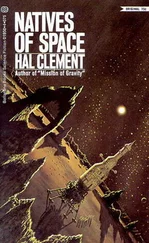Hal Clement - Space Lash
Здесь есть возможность читать онлайн «Hal Clement - Space Lash» весь текст электронной книги совершенно бесплатно (целиком полную версию без сокращений). В некоторых случаях можно слушать аудио, скачать через торрент в формате fb2 и присутствует краткое содержание. Год выпуска: 1969, Жанр: Фантастика и фэнтези, на английском языке. Описание произведения, (предисловие) а так же отзывы посетителей доступны на портале библиотеки ЛибКат.
- Название:Space Lash
- Автор:
- Жанр:
- Год:1969
- ISBN:нет данных
- Рейтинг книги:3 / 5. Голосов: 1
-
Избранное:Добавить в избранное
- Отзывы:
-
Ваша оценка:
- 60
- 1
- 2
- 3
- 4
- 5
Space Lash: краткое содержание, описание и аннотация
Предлагаем к чтению аннотацию, описание, краткое содержание или предисловие (зависит от того, что написал сам автор книги «Space Lash»). Если вы не нашли необходимую информацию о книге — напишите в комментариях, мы постараемся отыскать её.
Space Lash — читать онлайн бесплатно полную книгу (весь текст) целиком
Ниже представлен текст книги, разбитый по страницам. Система сохранения места последней прочитанной страницы, позволяет с удобством читать онлайн бесплатно книгу «Space Lash», без необходимости каждый раз заново искать на чём Вы остановились. Поставьте закладку, и сможете в любой момент перейти на страницу, на которой закончили чтение.
Интервал:
Закладка:
“I've been trying to think of a way to do that. If we laid the map out on the ground, some of the material might settle on it.”
“Worth trying. If it does, though, we'll have another question — why does it settle there and yet remain suspended long enough to do what is being done? We've been more than an hour coming down the slope, and I'll bet your astronomical friends of the past have reported obscurations longer lasting even than that.”
“They have. Well, even if it does raise more problems it's worth trying. Spread out the map, and we'll wait a few minutes.” Ridging obeyed; then, to keep the score even, came up with an idea of his own.
“Why don't you lay your camera on the ground pointing up and make a couple of time exposures of the stars? You could repeat them after we get back in the clear, and maybe get some data on the obscuring power of this material.”
“Good enough.” Shandara removed the camera from its case, clipped a sunshade over its lens, and looked up to find a section of sky with a good selection of stars. As usual, he had to shield his eyes both from sunlight and from the glare of the nearby hills; but even then he did not seem satisfied.
“This stuff is getting thicker, I think,” he said. “It's scattering enough light so that it's hard to see any stars at all — harder than it was a few minutes ago, I'd say.” Ridging imitated his maneuver, and agreed.
“That's worth recording, too,” he pointed out. “Better stay here a while and get several shots at different times.” He looked down again. “It certainly is getting thicker. I'm having trouble seeing you, now.”
Human instincts being what they are, the solution to the mystery followed automatically and immediately. A man who fails, for any reason, to see as clearly as he expects usually rubs his eyes — if he can get at them. A man wearing goggles or a space helmet may just possibly control this impulse, but he follows the practically identical one of wiping the panes through which he looks. Ridging did not have a handkerchief within reach, of course, and the gauntlet of a spacesuit is not one of the best windshield wipers imaginable; but without giving a single thought to the action, he wiped his faceplate with his gauntlet.
Had there been no results he would not have been surprised; he had no reason to expect any. He would probably have dismissed the matter, perhaps with a faint hope that his companion might not have noticed the futile gesture. However, there were results. Very marked ones.
The points where the plastic of the gauntlet actually touched the faceplate were few; but they left trails all the way across — opaque trails. Surprised and still not thinking, Ridging repeated the gesture in an automatic effort to wipe the smears of whatever it was from his helmet; he only made matters worse. He did not quite cover the supposedly transparent area with glove trails — but in the few seconds after he got control of his hand the streaks spread and merged until nothing whatever was visible. He was not quite in darkness; sunlight penetrated the obscuring layer, but he could not see any details.
“Shan!” The cry contained almost a note of panic. “I can't see at all. Something's covering my helmet!” The cartographer straightened up from his camera and turned toward his friend.
“How come? You look all right from here. I can't see too clearly, though…"
Reflexes are wonderful. It took about five seconds to blind Shandara as thoroughly as Ridging. He couldn't even find his camera to close the shutter.
“You know,” said Ridging thoughtfully after two or three minutes of heavy silence, “we should have been able to figure all this out without coming down here.”
“Why?”
“Oh, it's plain as anything…"
“Nothing, and I mean nothing, is plain right now.”
“I suppose a mapmaker would joke while he was surveying Gehenna. Look, Shan, we have reason to believe there's a magnetic storm going on, which strongly suggests charged particles from the Sun. We are standing, for practical purposes, on the Moon's south magnetic pole. Most level parts of the Moon are covered with dust — but we walked over bare rock from the foot of the rim to here. Don't those items add up to something?”
“Not to me.”
“Well, then, add the fact that electrical attraction and repulsion are inverse square forces like gravity, but involve a vastly bigger proportionality constant.”
“If you're talking about scale I know all about it, but you still don't paint me a picture.”
“All right. There are, at a guess, protons coming from the sun. They are reaching the Moon's surface here — virtually all of them, since the Moon has a magnetic field but no atmosphere. The surface material is one of the lousiest imaginable electrical conductors, so the dust normally on the surface picks up and keeps charge. And what, dear student, happens to particles carrying like electrical charges?”
“They are repelled from each other.”
“Head of the class. And if a hundred-kilometer circle with a rim a couple of kilos high is charged all over, what happens to the dust lying on it?”
Shandara did not answer; the question was too obviously rhetorical. He thought for a moment or two, instead, then asked, “How about our faceplates?”
Ridging shrugged — a rather useless gesture, but the time for fighting bad habits had passed some minutes before.
“Bad luck. Whenever two materials rub against each other, electrons come loose. Remember your rubber-and-cat-fur demonstrations in grade school. Unless the materials are of identical electronic makeup, which for practical purposes means unless they are the same substance, one of them will hang onto the electrons a little — or a lot — better than the other, so one will have a negative net charge and the other a positive one. It's our misfortune that the difference between the plastic in our faceplates and that in the rest of the suits is the wrong way; when we rubbed the two, the faceplates picked up a charge opposite to that of the surrounding dust — probably negative, since I suppose the dust is positive and a transparent material should have a good grip on its electrons.”
“Then the rest of our suits, and the gloves we wiped with in particular, ought to be clean.”
“Ought to be. I'd like nothing better than a chance to check the point.”
“Well, the old cat's fur didn't stay charged very long, as I remember. How long will it take this to leak off, do you think?”
“Why should it leak off at all?”
“What? Why, I should think — hm-m-m.” Shandara was silent for a moment. “Water is pretty wonderful stuff, isn't it?”
“Yep. And air has its uses, too.”
“Then we're. . Ridge, we've got to do something. Our air will last indefinitely, but you still can't stay in a spacesuit too long.”
“I agree that we should do something; I just haven't figured out what. Incidentally, just how sure are you that our air will last? The windows of the regenerators are made, as far as I know, of the same plastic our face-plates are. What'll you bet you're not using emergency oxygen right now?”
“I don't know — I haven't checked the gauges.”
“I'll say you haven't. You won't, either; they're outside your helmet.”
“But if we're on emergency now, we could hardly get back to the tractor starting this minute. We've got to get going.”
“Which way?”
“Toward the rim!”
“Be specific, son. Just which way is that? And please don't point; it's rude, and I can't see you anyway.”
“All right, don't rub it in. But Ridge, what can we do?”
“While this stuff is on our helmets, and possibly our air windows, nothing. We couldn't climb even if we knew which way the hills were. The only thing which will do us the least good is to get this dust off us; and that will do the trick. As my mathematical friends would say, it is necessary and sufficient.”
Читать дальшеИнтервал:
Закладка:
Похожие книги на «Space Lash»
Представляем Вашему вниманию похожие книги на «Space Lash» списком для выбора. Мы отобрали схожую по названию и смыслу литературу в надежде предоставить читателям больше вариантов отыскать новые, интересные, ещё непрочитанные произведения.
Обсуждение, отзывы о книге «Space Lash» и просто собственные мнения читателей. Оставьте ваши комментарии, напишите, что Вы думаете о произведении, его смысле или главных героях. Укажите что конкретно понравилось, а что нет, и почему Вы так считаете.












